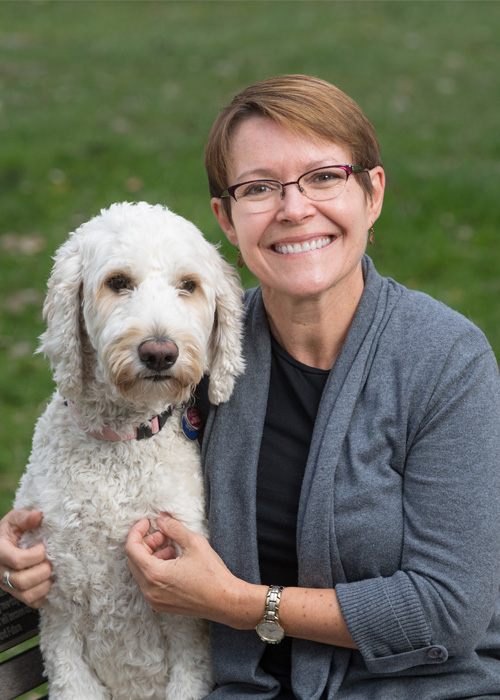
Dr. Susan Lana, D.V.M., M.S. Diplomate ACVIM (Oncology)
Director, Flint Animal Cancer Center
Stuart Chair in Oncology
Before I even knew I wanted to be a veterinarian, I had an interest in studying cancer. While in college at the University of Iowa, I worked in the blood bank of a hospital with a large bone marrow transplant unit. There, I began to understand that cancer is so different. It’s not just one disease; it’s many diseases with many different outcomes. It’s also a non-discriminatory disease; anybody can get it. You don’t have to be rich or poor, black or white, or a dog or a cat…anybody can be touched by cancer. I knew cancer was something I could see myself learning about for a long time.
After receiving my B.S. in medical technology, I thought about going to medical school to advance my scientific degree. But when I volunteered for the Denver Dumb Friends League, I realized that I really like working with animals, and my interest turned to veterinary medicine. I applied to veterinary school at Colorado State University and was accepted. It wasn’t until a lecture by a veterinary oncologist in my freshman year of vet school that I discovered there was a cancer specialty in veterinary medicine, just like in human medicine. And during a summer job with the Flint Animal Cancer Center, when I saw how the oncology doctors interacted with the clients, the patients, and the nursing staff, I was hooked. I realized there’s a lot that I can do for people and their pets by studying cancer.
After I completed my D.V.M. at Colorado State University in 1993, I went to Texas A&M University for a small animal internship. Following, I returned to CSU for specialty training in medical oncology. I have been on faculty at CSU since 1999, and I am currently the Clinical Oncology Service Chief, which means that I oversee all clinical activities within the Flint Animal Cancer Center. During my time at the Flint Animal Cancer Center, I’ve learned how important my role is in helping clients during a very emotional time. I love being a resource for clients and helping them through their pet’s diagnosis. When people are upset or don’t know what to do, sometimes they need a calming presence to be there and say, “Here are some choices. This is how we can help your pet.” I can bring them hope. There’s just so much that can be done for pets with cancer, advances are happening all of the time, and that’s what I love being part of.
Seeing the advances in technology over the years and being able to incorporate a comprehensive model of patient care has made this an exceptionally rewarding career. We now treat a patient with multiple modalities – radiation therapy, surgery, and chemotherapy – and also perform advanced procedures similar to what you would expect to be done for human patients. These enhancements are due to advances in the fields of imaging, anesthesia, and critical care, as well as improved techniques in medical and surgical oncology. Everybody involved, from the doctors to the students and nursing staff, contributes to the mission of the Flint Animal Cancer Center. We work together to provide the best care possible for our patients.
One of the differences between being a regular veterinarian and a veterinarian in a specialty practice at a place like the Flint Animal Cancer Center is we do more than just see clients and treat patients. We move the greater body of knowledge surrounding cancer forward for veterinary patients and human patients. All the other things that go into our days, like teaching and doing research, are equally important to our mission. These all combine to help the Flint Animal Cancer Center improve the lives of people and pets with cancer. I hope that someday an oncologist treating human patients will benefit from something that learned here.